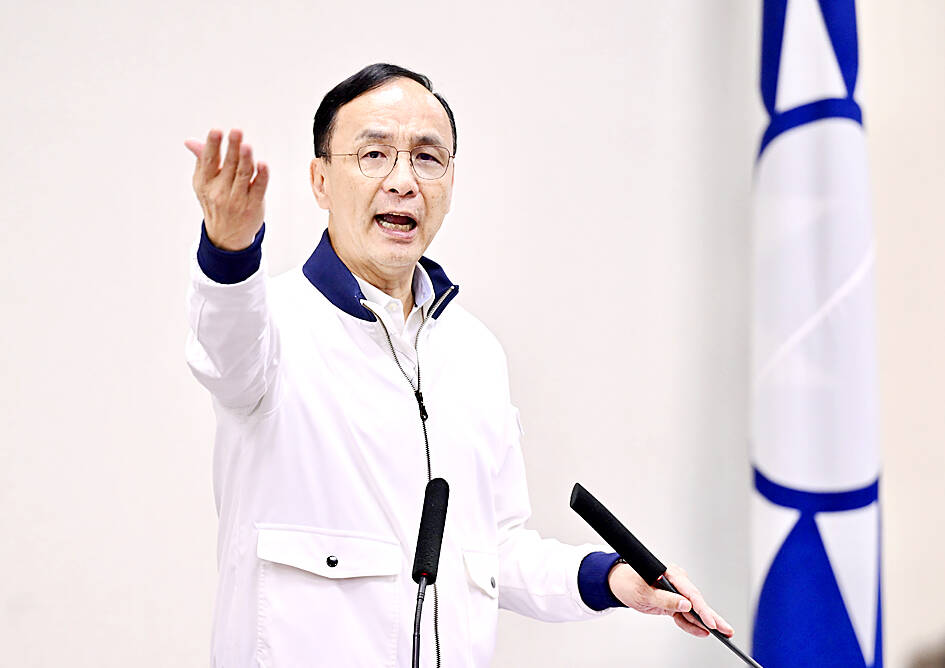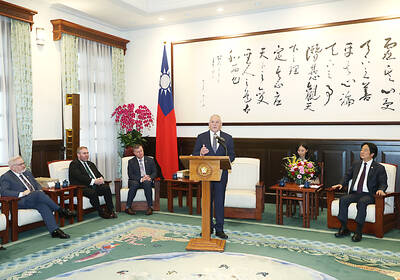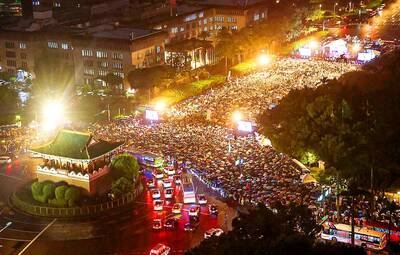Chinese-language media reporting that the US is pressing Taiwan on currency exchange rates were based on a misinterpretation of a South Korean news report, the Ministry of Foreign Affairs said on Tuesday.
Taiwan was conducting talks over tariffs with US officials, but the negotiations did not touch on the New Taiwan dollar’s value, President William Lai (賴清德) said on Monday.
Taiwan is on a US trade watchlist due to a trade imbalance, but has not been named as a currency manipulator, Lai said, adding that media should guard against spreading disinformation.

Photo: Lo Pei-de, Taipei Times
On Tuesday, the China Times reported that Bank of Korea Governor Rhee Chang-yong had delivered a “slap in the face” to Lai by acknowledging that the US was pressuring Asian nations over currency rates.
However, “a certain media outlet” had misconstrued Rhee’s statements, the ministry said in a statement.
The South Korean official’s comments referred to market effects on Asian currencies and did not indicate that Taiwan was under pressure from the US over exchange rates, the statement added.
“Asian currencies, including the won, have been gaining ground partly due to the US administration’s pressure on Asian countries to appreciate their currencies, and also on expectations of a potential resumption of trade talks between the US and China,” Rhee was paraphrased as saying in an English-language report by Yonhap News Agency.
The Office of Trade Negotiations on Monday said that Taiwanese and US officials did not talk about exchange rates and the central bank is not a party to the negotiations, the ministry said.
Chinese Nationalist Party (KMT) Chairman Eric Chu (朱立倫) yesterday repeated the China Times’ allegations, saying that Lai’s remarks were tantamount to “turning a blind eye to reality.”
The Democratic Progressive Party (DPP) is “kneeling before the US” in a betrayal of the nation, Chu said.
He alleged that during talks in March, the government gave to the US Taiwan Semiconductor Manufacturing Co’s technology, the most valuable bargaining chip that Taiwan has.

‘NON-RED’: Taiwan and Ireland should work together to foster a values-driven, democratic economic system, leveraging their complementary industries, Lai said President William Lai (賴清德) yesterday expressed hopes for closer ties between Taiwan and Ireland, and that both countries could collaborate to create a values-driven, democracy-centered economic system. He made the remarks while meeting with an Irish cross-party parliamentary delegation visiting Taiwan. The delegation, led by John McGuinness, deputy speaker of the Irish house of representatives, known as the Dail, includes Irish lawmakers Malcolm Byrne, Barry Ward, Ken O’Flynn and Teresa Costello. McGuinness, who chairs the Ireland-Taiwan Parliamentary Friendship Association, is a friend of Taiwan, and under his leadership, the association’s influence has grown over the past few years, Lai said. Ireland is

A saleswoman, surnamed Chen (陳), earlier this month was handed an 18-month prison term for embezzling more than 2,000 pairs of shoes while working at a department store in Tainan. The Tainan District Court convicted Chen of embezzlement in a ruling on July 7, sentencing her to prison for illegally profiting NT$7.32 million (US$248,929) at the expense of her employer. Chen was also given the opportunity to reach a financial settlement, but she declined. Chen was responsible for the sales counter of Nike shoes at Tainan’s Shinkong Mitsukoshi Zhongshan branch, where she had been employed since October 2019. She had previously worked

FINAL COUNTDOWN: About 50,000 attended a pro-recall rally yesterday, while the KMT and the TPP plan to rally against the recall votes today Democracy activists, together with arts and education representatives, yesterday organized a motorcade, while thousands gathered on Ketagalan Boulevard in Taipei in the evening in support of tomorrow’s recall votes. Recall votes for 24 Chinese Nationalist Party (KMT) lawmakers and suspended Hsinchu City mayor Ann Kao (高虹安) are to be held tomorrow, while recall votes for seven other KMT lawmakers are scheduled for Aug. 23. The afternoon motorcade was led by the Spring Breeze Culture and Arts Foundation, the Tyzen Hsiao Foundation and the Friends of Lee Teng-hui Association, and was joined by delegates from the Taiwan Statebuilding Party and the Taiwan Solidarity

The Taipei District Court today ruled to extend the incommunicado detention of former Taipei mayor Ko Wen-je (柯文哲) and Taipei City Councilor Angela Ying (應曉薇) for two more months as part of an ongoing corruption trial. Codefendants in the case — real-estate tycoon Sheen Ching-jing (沈慶京) and Ko's former mayoral office head Lee Wen-tsung (李文宗) — were granted bail of NT$100 million (US$3.4 million) and NT$20 million respectively. Sheen and Lee would also be barred from leaving the country for eight months and prohibited from contact with, harassing, threatening or inquiring after the case with codefendants or witnesses. The two would also be